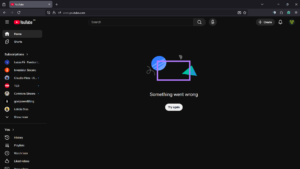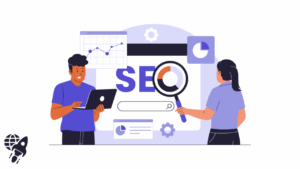In today’s digital age, an author website is more than just an online business card, it’s a powerful tool for building a connection with readers, showcasing your work, and growing your personal brand. With the rise of self-publishing and the vast number of books available online, standing out from the crowd requires more than just writing a great book. It’s about having a well-designed, easily discoverable website that attracts readers, builds credibility, and helps you establish a lasting presence in the literary world. In this practical guide, you’ll learn the process of designing author websites for SEO success.
An effective author website serves several crucial purposes. Beyond simply displaying your book or books, it acts as a central hub where readers can learn more about you, sign up for newsletters, engage with your content, and, ultimately, purchase your work. It’s also a space to build your personal brand, highlight upcoming events, and share insights into your writing process or career. But to make all this happen, your website must be designed with SEO in mind—so readers can actually find you.
In this article, we’ll provide a practical, actionable guide to building an SEO-friendly author website. By following these steps, you’ll not only enhance your site’s visibility in search engines but also set yourself up for long-term success. Whether you’re just starting out or looking to improve your current website, these SEO tips will help ensure that your online presence stands out and reaches the right audience.
Understanding the Role of SEO in Author Websites
SEO, or Search Engine Optimization, is the practice of optimizing a website to improve its ranking on search engines like Google. The higher a website ranks, the more likely it is to be seen by potential readers. For authors, this means that SEO is essential for making their websites visible to a broader audience. Whether it’s readers looking for a new book to read, literary agents, or media outlets seeking fresh talent, author website design is at the forefront of discoverability.
SEO works by optimizing various elements of your website, from content and design to technical features like page speed and mobile responsiveness. By strategically using relevant keywords, creating high-quality content, and ensuring your site is easy to navigate, SEO increases your chances of appearing in search results when readers search for books in your genre or topics related to your work. This increased visibility helps authors reach a wider audience, build an online following, and ultimately boost sales.
In today’s competitive publishing landscape, author websites are often one of the first points of contact for potential readers. With millions of books and authors competing for attention online, standing out can be a challenge. SEO can serve as a game-changer by allowing authors to differentiate themselves in this crowded space. A website that is optimized for search engines is more likely to rank higher, attract organic traffic, and make a lasting impression on visitors. Without proper SEO, even the most well-crafted author website can go unnoticed, limiting its potential to connect with readers and generate interest in your books.
Key Elements of an SEO-Friendly Author Website
Mobile-Responsive: Guide Designing Author Websites SEO
Mobile responsiveness is crucial for both SEO and user experience. With Google’s mobile-first indexing, a website that adapts well to mobile devices will rank higher. Ensuring your site is mobile-friendly improves usability and search engine visibility.
Fast Loading Speed
A fast-loading website enhances user experience and SEO. Slow sites lead to high bounce rates, negatively impacting rankings. To improve speed, optimize images, minimize requests, and enable caching.
Clean and Simple Navigation
An intuitive site structure is vital for both user experience and SEO. Clear categories, search functionality, and a simple menu help visitors find content easily and allow search engines to crawl your site efficiently.
Clear and Engaging Content Guide Designing Author Websites SEO
High-quality, keyword-rich content is essential for SEO. Include an optimized author bio, detailed book pages, a blog, and event listings. This content not only engages readers but also improves your website’s search visibility.
Keyword Research: The Foundation of SEO for Author Websites
Keyword research is the process of identifying the words and phrases that potential readers are searching for online. By incorporating these keywords into your website’s content, you improve your chances of appearing in search engine results when readers search for relevant topics, genres, or books. It’s a vital step in making sure your website is discoverable.
For authors, the key to effective keyword research lies in identifying terms that align with your genre, themes, and the interests of your target audience. For example, if you’re writing a mystery novel, keywords like “best mystery books,” “detective fiction,” or “suspense novels” could attract the right readers. Similarly, if your book addresses specific topics like historical events or personal growth, include keywords related to those themes, like “historical fiction” or “self-help books.”
To find relevant keywords, use tools like:
- Google Keyword Planner: Helps identify popular search terms and provides data on search volume.
- Ahrefs or SEMrush: Provide insights into the keywords your competitors are ranking for.
- Ubersuggest: A user-friendly tool to explore keyword ideas based on your book genre.
Once you’ve identified your keywords, integrate them naturally into your website’s content—such as in your book pages, author bio, blog posts, and meta descriptions—without keyword stuffing. Focus on creating valuable content that resonates with your audience while subtly weaving in the keywords to improve your website’s search engine ranking.
Optimizing Author Website Content for SEO
Crafting SEO-Friendly Titles and Meta Descriptions – Guide Designing Author Websites SEO
Compelling titles and meta descriptions are crucial for improving click-through rates from search engine results. Your title should include relevant keywords while being clear and engaging, drawing readers in. For example, instead of just “My Book,” use something like “Mystery Thriller Novel – A Suspenseful Journey Through Dark Secrets.” Meta descriptions should summarize the page content in 150-160 characters, incorporating key terms and providing a reason for users to click.
Optimizing for Featured Snippets
Appearing in Google’s featured snippets can significantly boost visibility. These snippets showcase brief, direct answers to common questions at the top of search results. To optimize for featured snippets, structure your content to answer frequently asked questions in a concise, well-organized format. For instance, if your book is a historical fiction novel, include sections like “What is historical fiction?” and provide a clear answer.
Utilizing Headings and Subheadings
Proper heading hierarchy (H1, H2, H3) helps search engines understand the structure of your content, making it easier to index. Use H1 for your main title, and H2 and H3 for subheadings that break down content into digestible sections. This not only improves SEO but also enhances readability, guiding visitors through your content smoothly.
Guide Designing Author Websites SEO: Internal Linking
Internal linking boosts SEO by distributing ranking power across your site and helping search engines understand the relationships between pages. Use internal links to guide users to other relevant pages, such as linking from your book page to your blog posts or author bio. This improves site navigation, encourages deeper engagement, and helps search engines index your content more efficiently.
Visual Elements: Enhancing SEO with Images and Multimedia
Optimizing images and multimedia is crucial for both SEO and user experience. Well-optimized visuals improve loading times, accessibility, and engagement, which directly impact search rankings.
Optimizing Images for SEO
- Use proper formats: JPEG for photos, PNG for graphics, and WebP for faster load times.
- Compress images: Tools like TinyPNG reduce file sizes without losing quality.
- Descriptive file names: Name images with relevant keywords, such as “historical-fiction-book-cover.jpg.”
Adding Alt Text: Guide Designing Author Websites SEO
Alt text improves accessibility and SEO by describing images for search engines and visually impaired users. Include relevant keywords, but keep it natural, e.g., “The Lost Kingdom – Historical Fiction Novel by [Author Name].”
Leveraging Video Content
Videos, such as book trailers or interviews, enhance engagement and SEO. Optimize video titles and descriptions with keywords, and include transcripts for better indexing. Embedding YouTube videos also helps increase visibility and traffic.
By optimizing images and multimedia, you can boost both user experience and SEO performance.
Building Author Brand Authority with SEO
Backlinks, or links from other websites to your own, play a crucial role in improving your website’s SEO and building brand authority. Search engines view backlinks as a vote of confidence, signaling that your content is valuable and trustworthy. For authors, acquiring quality backlinks can significantly boost visibility and credibility in the digital space.
Strategies for Earning Quality Backlinks
- Guest blogging: Writing posts for reputable blogs in your genre or the literary world can earn valuable backlinks while reaching new audiences.
- Collaborating with other authors: Co-authoring content, exchanging blog links, or participating in author roundups helps build backlinks and expand your network.
- Interviews and features: Being featured on podcasts, literary blogs, or news sites provides high-quality backlinks and increases your exposure.
The Value of Being Featured in Reputable Sites
Getting featured in respected literary sites, podcasts, or blogs not only earns you backlinks but also enhances your domain authority. The more reputable sites that link to your content, the more search engines trust your website, improving your overall SEO and online presence.
Building backlinks through strategic collaborations and features helps establish your online reputation and boost your author brand authority.
Local SEO: Making Your Author Website Discoverable in Local Searches
Local SEO is essential for authors who actively engage with their local communities through events, book signings, or speaking engagements. By optimizing your website for local search, you can attract readers nearby who are more likely to attend your events, buy your books, or support your work.
Optimizing Your Website for Local Search: To make your author website more discoverable in local searches, include location-specific keywords such as your city or region in your content, meta descriptions, and event pages. For example, if you’re hosting a book signing in San Diego, include phrases like “San Diego author book signing” or “book events in San Diego” to improve your local search ranking.
Setting Up Google My Business: Google My Business (GMB) is a powerful tool for local SEO. Set up your GMB profile to ensure your website appears in local search results, especially in the “local pack” or Google Maps listings. Include your author name, business hours (if applicable), and relevant categories.
NAP Consistency: Ensure NAP (Name, Address, Phone Number) consistency across all online platforms, including your website, Google My Business, social media, and other directories. Consistent NAP information helps Google trust your location data, improving local search rankings.
By optimizing for local SEO, authors can increase visibility within their communities and drive more engagement with local readers.
Guide Designing Author Websites SEO Conclusion
An SEO-friendly author website is a valuable investment in your long-term success. By optimizing your site for search engines, you can increase visibility, drive traffic, and ultimately boost book sales. From mobile-responsive design to quality content and strategic local SEO, every element plays a crucial role in making your website more discoverable to potential readers.
We encourage you to implement the tips shared in this guide to enhance your website’s SEO and take your author brand to the next level. A well-optimized website helps you stand out in a competitive market, reach a wider audience, and connect with readers who will support your work.








